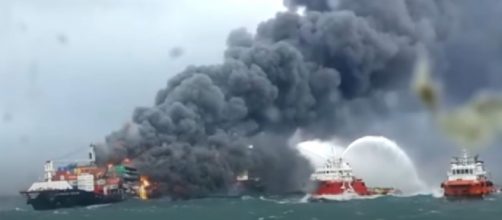The Singapore-registered X-Press Pearl was a cargo ship loaded with different types of chemicals. It caught fire off the coast of Sri Lanka nearly two weeks back. Efforts to put out the blaze succeeded, but fears of an environmental disaster looming on the horizon. This is because the huge amount of oil in the fuel tanks would find its way into the water and pollute the surroundings. That would mean loss of marine lives and a major disaster that might have far-reaching implications.
The BBC reports that the Navy of Sri Lanka and India joined forces to fire.
They also tried to prevent the ship from breaking up and sinking. However, the seas were rough, and the climatic conditions did not help the cause. The location was near the port of Colombo. Salvage experts tried to move the ship out into deeper waters. They intended to reduce the possibilities of pollution risk to coastal regions, but they had to abandon that line of action. This was because the rear portion of the ship had already touched the seabed.
The sinking of the ship posed an environmental issue
X-Press Feeders are the operators of the ship. It says the aft portion is resting on the seabed at a depth of about 69ft while the forward section is gradually settling down. The Sri Lankan navy confirmed that the bow was above the waterline.
A spokesman clarified: “There is no oil leak from the ship yet.” He added that necessary arrangements are being made to cater to a possible spill. The BBC quotes environmentalist Dr Ajantha Perera saying that the sinking posed "the worst environmental scenario." She explains that there are dangerous goods on board the ship.
These include chemicals like nitric acid, apart from the oil in the ship. Once the ship sinks, it would destroy the Environment of the seabed. In March, Israel cleared a Greek tanker as the perpetrator of an oil spill that could give rise to issues related to the environment.
After-effects of the fire on the ship
Negombo is a coastal stretch near the capital Colombo.
It has some of the pristine beaches in Sri Lanka, and it has faced oil and debris pollution. The fisheries ministry outlined emergency measures to protect the Negombo lagoon and nearby areas. The authorities suspended fishing in the region. An official of the regional fishing union cautioned that the sinking of the ship would have serious after-effects. In his words: "We can't go to the sea, which means we can't make a living." The BBC mentions the cargo that consisted of nitric acid. This is highly corrosive and used in the manufacture of fertilizers and explosives. It seems the crew was aware of the leak.
A Fire-stricken cargo ship sank off the coast of Sri Lanka
According to Sky News, MV X-Press Pearl registered in Singapore was anchored and awaiting clearance to enter the port of Colombo when a fire broke out.
That was on May 20. The ship carried a huge consignment of chemicals, which led to pollution of the waters along the beaches. In addition, there are worries of large-scale spillage of oil from fuel tanks into the sea. That could pose survival problems for marine life and disturbance to the environment. Restoring them would not be an easy task. The government has already imposed a ban on fishing along a stretch of the coastline. Hundreds of soldiers are also deployed to clean the beaches. The ship left India on May 15 and was on its way to Singapore via Colombo. The government is investigating and could take legal action against the owners of the ship to claim compensation.


